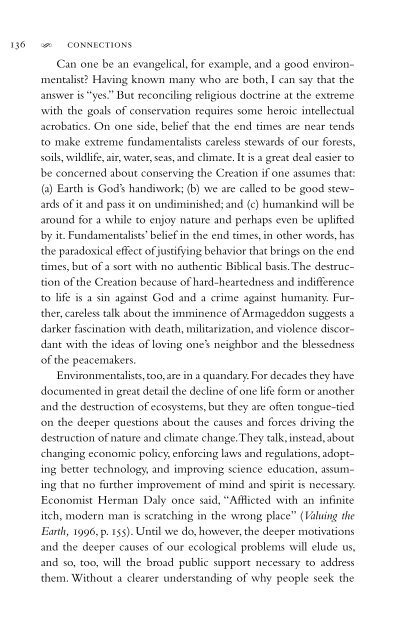Down to the wire : confronting climate collapse / David - Index of
Down to the wire : confronting climate collapse / David - Index of
Down to the wire : confronting climate collapse / David - Index of
Create successful ePaper yourself
Turn your PDF publications into a flip-book with our unique Google optimized e-Paper software.
S<br />
136 connections<br />
Can one be an evangelical, for example, and a good environmentalist?<br />
Having known many who are both, I can say that <strong>the</strong><br />
answer is “yes.” But reconciling religious doctrine at <strong>the</strong> extreme<br />
with <strong>the</strong> goals <strong>of</strong> conservation requires some heroic intellectual<br />
acrobatics. On one side, belief that <strong>the</strong> end times are near tends<br />
<strong>to</strong> make extreme fundamentalists careless stewards <strong>of</strong> our forests,<br />
soils, wildlife, air, water, seas, and <strong>climate</strong>. It is a great deal easier <strong>to</strong><br />
be concerned about conserving <strong>the</strong> Creation if one assumes that:<br />
(a) Earth is God’s handiwork; (b) we are called <strong>to</strong> be good stewards<br />
<strong>of</strong> it and pass it on undiminished; and (c) humankind will be<br />
around for a while <strong>to</strong> enjoy nature and perhaps even be uplifted<br />
by it. Fundamentalists’ belief in <strong>the</strong> end times, in o<strong>the</strong>r words, has<br />
<strong>the</strong> paradoxical effect <strong>of</strong> justifying behavior that brings on <strong>the</strong> end<br />
times, but <strong>of</strong> a sort with no au<strong>the</strong>ntic Biblical basis. The destruction<br />
<strong>of</strong> <strong>the</strong> Creation because <strong>of</strong> hard-heartedness and indifference<br />
<strong>to</strong> life is a sin against God and a crime against humanity. Fur<strong>the</strong>r,<br />
careless talk about <strong>the</strong> imminence <strong>of</strong> Armageddon suggests a<br />
darker fascination with death, militarization, and violence discordant<br />
with <strong>the</strong> ideas <strong>of</strong> loving one’s neighbor and <strong>the</strong> blessedness<br />
<strong>of</strong> <strong>the</strong> peacemakers.<br />
Environmentalists, <strong>to</strong>o, are in a quandary. For decades <strong>the</strong>y have<br />
documented in great detail <strong>the</strong> decline <strong>of</strong> one life form or ano<strong>the</strong>r<br />
and <strong>the</strong> destruction <strong>of</strong> ecosystems, but <strong>the</strong>y are <strong>of</strong>ten <strong>to</strong>ngue-tied<br />
on <strong>the</strong> deeper questions about <strong>the</strong> causes and forces driving <strong>the</strong><br />
destruction <strong>of</strong> nature and <strong>climate</strong> change. They talk, instead, about<br />
changing economic policy, enforcing laws and regulations, adopting<br />
better technology, and improving science education, assuming<br />
that no fur<strong>the</strong>r improvement <strong>of</strong> mind and spirit is necessary.<br />
Economist Herman Daly once said, “Affl icted with an infi nite<br />
itch, modern man is scratching in <strong>the</strong> wrong place” (Valuing <strong>the</strong><br />
Earth, 1996, p. 155). Until we do, however, <strong>the</strong> deeper motivations<br />
and <strong>the</strong> deeper causes <strong>of</strong> our ecological problems will elude us,<br />
and so, <strong>to</strong>o, will <strong>the</strong> broad public support necessary <strong>to</strong> address<br />
<strong>the</strong>m. Without a clearer understanding <strong>of</strong> why people seek <strong>the</strong>
















